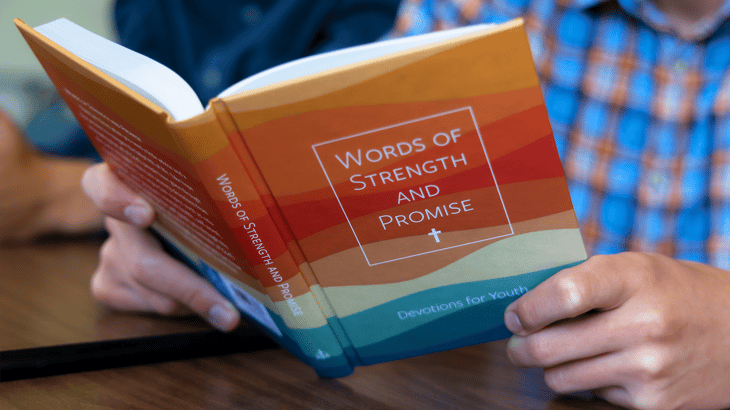Helpful Bible-Reading Resources for Families
Reading the Bible is a joy that Christians are called to continually, with the Word dwelling in us richly, as Colossians 3:16 states. Although the Word of God is powerful and never returns void, many Christians may feel challenged by not knowing how to read, understand, and apply Scripture with confidence. Continue to discover resources that meet readers where they are, from those opening the Bible for the first time to those seeking deeper study. Each tool is designed to illuminate context, help us see Law and Gospel more clearly, and draw us closer to Christ.
How to Answer 5 Common Questions about Jesus Christ
The Bible is a massive book comprising so many important stories of biblical figures. Yet, when reading through it or listening to the readings on Sunday, many things about Jesus can come up. Here are some ways to answer five common questions concerning Jesus Christ and His forgiveness.
3 Principles to Guide Your Study of the Old Testament
The Bible makes it clear that Jesus is the main focus of the New Testament. After all, it was His sacrifice on the cross that saved us. But the importance of Jesus as the Messiah can’t be understood just from the New Testament. The prophecy of a Messiah started in the Old Testament, and that prophecy is key to understanding how Jesus perfectly fulfilled that role.
Do We Have Prophets Today?
The Old Testament is full of prophets and their prophecies about God’s will for that time and the age to come. But what about today? Do we still have prophets? The following has been adapted from The Baptismal River: Studying the Sacrament throughout Scripture.
Making Sense of the Whole Bible: Piecing God’s Story Together
Reading the Bible seems easy enough, doesn’t it?
Reading the Bible seems easy enough until you find yourself knee-deep in a genealogical list of seemingly unpronounceable names, waist-deep in Levitical laws, chest-deep in the sacrifices and imagery of the temple, neck-deep in the perplexing visions of prophets such as Ezekiel or Daniel, and in-over-your-head with St. John’s visions in Revelation. Let’s be honest. The Bible can be very difficult to understand and rather incomprehensible at times. When reading it, you might even find yourself wondering, “What does any of this have to do with what I previously read?” and “What does this have to do with my daily life?”
Top Five Misunderstood Sayings of Jesus
There are many of Jesus’ sayings and teachings from the New Testament that are frequently misunderstood. Whether the verses are taken out of context or the understanding behind them is simply harder to uncover, Jesus’ words can seem harsh or backward from how Christians see Him.
Best Biblical Devotions for Your Shelf
Devotionals are a pivotal part of any daily faith enrichment. Just as you try to have conversations with your friends daily, it’s important to keep a conversation going with God the Father so He can guide you in life. He pours His love and grace out to you when you sit with Him through reflection and prayer. Additionally, devotions give you a moment of rest and reset from the busyness of daily life. Come back to God daily with the help of these top ten devotionals that are certain to fit your lifestyle.
The Cycle of the Christian Life—Oratio, Meditatio, Tentatio
The longest chapter in the Bible is Psalm 119. The Psalm is divided into twenty-two sections, one for each letter of the Hebrew alphabet. Each section speaks about God’s Word in a vast variety of ways. We hear God’s Word referred to as His precepts, testimonies, Law, statutes, commandments, rules, ways, and of course, Word.
Psalm 119 is a masterpiece of meditation and prayer. It brings the reader or hearer of the psalm back again and again to a love of God’s Word, a delight in learning and understanding more about God.
How I Learned to Study Scripture
Before I officially joined a church, I tried to study Scripture on my own. I wanted to learn more about Jesus and how the Old and New Testaments both point to salvation through Jesus Christ alone. But I didn’t know how to, and I was embarrassed that I didn’t understand it and couldn’t just “do it on my own.”
When I talk to others—even those who have been involved in churches since birth—I hear similar sentiments. Do you find studying Scripture on your own to be difficult? We all need to be reminded that reading Scripture is a skill that needs support and structure. That might seem totally different from other types of reading, but when we read Scripture, we are studying an ancient text. It makes total sense to structure studying.
3 Commonly Misunderstood Bible Verses
When we quote Bible verses, our intentions are often good. We want to encourage ourselves and others, so we put Bible verses on home décor, shirts, mugs, bumper stickers, and social media. However, it can be easy to take Bible verses out of context if we don’t stop to ask, “How did we get here?”
Author Andrew R. Jones shares three popular Bible verses that are misunderstood and provides context for them below.

.jpg?width=50&height=50&name=IMG_20220621_160541_456%20(1).jpg)























